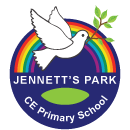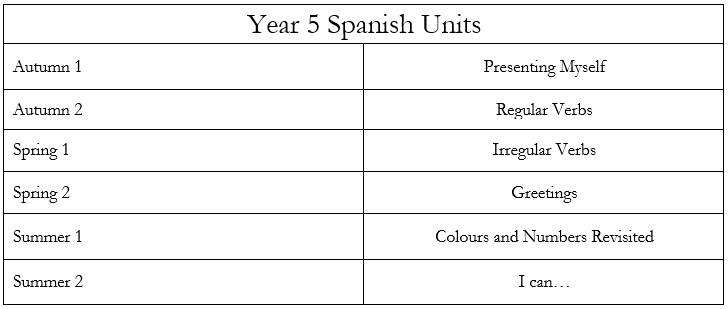The Modern Foreign Language Curriculum at Jennett's Park comprises of:
| Educating for Wisdom, Knowledge and Skills | To help grow resourceful, resilient and reflective pupil who are equipped with the skills, knowledge and tenacity empower themselves, their learning throughout their lives. |
| Educating for Hope and Aspiration | To inspire and enrich lives beyond current opportunities and experiences in order to open minds to the potential their future holds |
| Educating for Community and Living Well Together | To be a multi-cultural, inclusive community of individuals loved by God who feel valued and involved where we create qualities of character to enable people to flourish. |
| Educating for Dignity and Respect | That pupil might know how much that they are loved and valued by so that they might show dignity and respect for themselves and others by carefully and safely thinking through their actions. |
Intent
At our school we want to inspire children to learn and develop continually throughout their life. We aim to equip them with the skills to ensure that they can communicate effectively, not only in their own language, but in that of other countries too. By building the children’s breadth of language, we will also be educating them about the differences between other countries and our own. This gives them the skills to be compassionate and well-educated individuals which will in turn work on eliminating prejudice and misguidance.
Language is a key skill, and is something that we value from an early age at Jennett’s Park. The ability to communicate with a wide range of people across our globe is one that is becoming more critical in the world we live in. We want our children to become part of our global community and language learning will enable this. We aim for foreign language to be embedded into our everyday lives so that children can understand the importance and necessity of learning a variety of languages. International studies have shown repeatedly that foreign language learning increases critical thinking skills, creativity, and flexibility of mind in young children. Pupils who learn a foreign language do better on both verbal and math tests than those that don’t. Learning a foreign language actually increases the density of ‘grey matter’ in the brain and the number of synapses, that interconnect parts of the brain. Through studying a foreign language, grammatical concepts and rules in English become clearer. Children use what they learn in one language to reinforce what they’ve learned in another.
Implementation
Primary pupils are very receptive to learning a new language. They are willing and able to mimic pronunciation without the inhibitions and self-consciousness of older students. They enjoy playing with the language and pick it up very quickly. Their sensitive ears help them pick up on and duplicate tricky sounds that adults, and even adolescents, often stumble over. In primary schools, children typically spend the whole day with one class teacher who covers the whole curriculum. This is ideal for foreign language learning as teachers can exploit many opportunities to integrate foreign language into everyday classroom routines (such as calling the register), and into other lessons (such as counting in the foreign language during PE lessons or designing a replacement for the Eiffel Tower in Design & Technology). A class teacher who teaches everything, including the foreign language, helps reinforce the hidden message that ‘everyone can do it.’
EYFS and KS1
Foreign language learning is not compulsory in KS1 or Early Years but at Jennett’s Park we are striving for our foreign languages to be embedded across the whole school learning. Young children pick up language so easily and are often more enthusiastic than their older peers, so beginning their foreign language journey early creates that community of language being a natural part of life. Therefore we teach a range of foreign languages across both EYFS and KS1. In Nursery children begin their journey by looking at Makaton and British Sign language. This develops their understanding of the English language and introduces a new language learning skill that is essential for their development. In Reception children begin exploring a variety of different languages by choosing languages that are relevant to them. For example, if a child in the class speaks German at home, then the children will learn a few key phrases in this language. This ensures that the language learning is relevant, personal and motivating for the children. As children move into KS1 we begin to look at learning a new foreign language each half term. This language will not always be one of your ‘usual’ language choices such as Spanish or French but will look at a range of other languages from around the world such as Mandarin, Portuguese or Polish. This broadens the children’s understanding and natural interest for language learning whilst also linking to their topics, Geography and many other curriculum areas.
KS2
In KS2 there is a set framework from the curriculum on language learning and this is where children will focus on one language for 2 years at a time. At Jennett’s Park we focus on Spanish in KS2 . This model of developing the language over 4 years gives the children more time to develop deeper level skills such as speaking in sentences or understanding simple grammar. Below you will find the outline for language learning in KS2. Please note that this is the same for both languages.
Jennett’s Park pupils are taught to:
- listen attentively to spoken language and show understanding by joining in and responding
- explore the patterns and sounds of language through songs and rhymes and link the spelling, sound and meaning of words
- engage in conversations; ask and answer questions; express opinions and respond to those of others; seek clarification and help
- speak in sentences, using familiar vocabulary, phrases and basic language structures
- develop accurate pronunciation and intonation so that others understand when they are reading aloud or using familiar words and phrases
- present ideas and information orally to a range of audiences
- read carefully and show understanding of words, phrases and simple writing
- appreciate stories, songs, poems and rhymes in the language
- broaden their vocabulary and develop their ability to understand new words that are introduced into familiar written material, including through using a dictionary
- write phrases from memory, and adapt these to create new sentences, to express ideas clearly
- describe people, places, things and actions orally and in writing Languages
- understand basic grammar appropriate to the language being studied, including (where relevant): feminine, masculine and neuter forms and the conjugation of high-frequency verbs; key features and patterns of the language; how to apply these, for instance, to build sentences; and how these differ from or are similar to English.
Impact
We encourage our children to enjoy and value the language curriculum we deliver. We want learners to appreciate the importance of language learning in relation to their every day life as well as the impact it can have on their future. It is important children understand the global community that we live in and are empathetic towards the cultural differences of people in our country and in others. Children gain a great sense of accomplishment from learning to say something in a foreign language – it’s like learning to crack a code! Language learning also provides frequent opportunities to perform before an audience. This nurtures pupils’ self-esteem and self-confidence and develops strong interpersonal skills. Developing skills in language learning, making connections, creative and critical thinking and flexibility of mind are all skills that are developed through the learning of a foreign language and are skills which are fundamental in a child’s success in later life.



